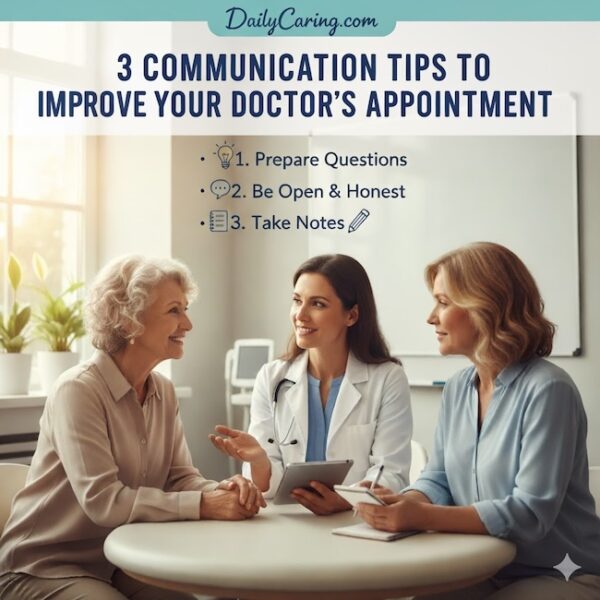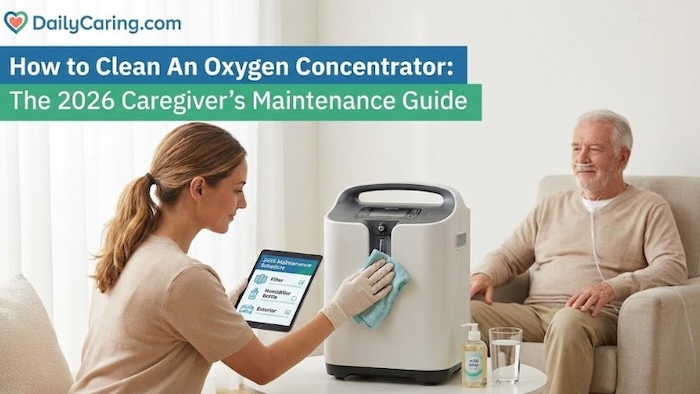Does a doctor's appointment with your loved one often feel like a missed opportunity? You leave the office only to remember a critical symptom you forgot to mention or a question you left unasked in the rush. You're left with a handful of instructions you only half-remember and the sinking feeling that the 15-minute slot wasn't nearly enough.
This common frustration doesn't have to be the norm. Transforming a routine check-up into a powerful, productive partnership is possible. With a few strategic shifts, you can ensure your loved one's voice is heard, their concerns are addressed, and you both walk out with a clear, actionable plan for their health.

Stay Fully Engaged to Maximize Your Time at the Doctor's Office
Having a good understanding of your older adult’s health conditions is especially important because they’re usually managing severe chronic conditions or multiple health problems.
As their health advocate, knowing what’s going on with your older adult’s medications and treatments helps reduce medication errors and improve quality of life.
We explain why a lack of clarity can contribute to health problems and share 3 tips to improve communication and understanding during your older adult’s doctor visits.
Leaving the Doctor's Office Uninformed Can Increase One's Health Risk
Not clearly understanding information or instructions from your older adult’s doctors could contribute to serious health issues.
Issues could include:
- Going back to the hospital for the same health condition within a short period of time.
- Problems with medication because of an incorrect dose or timing, adverse drug interactions, or harmful side effects.
- Having a medical emergency because early warning signs for a health condition weren’t known.
- Not knowing how to properly use or maintain crucial medical equipment such as an insulin pump, pacemaker, or catheter.
Don't Be Afraid to Speak Up and Ask Questions
At your loved one's doctor visits, make sure you understand everything the doctor tells you about their health and how to manage their conditions.
If the doctor says anything that you don’t understand, speak up immediately and ask them to explain using simpler terms.
Don’t feel embarrassed – you didn’t go to medical school and shouldn’t be expected to understand instantly.
The doctor’s job is to ensure your older adult receives good care. An essential part of that is making sure you can make informed decisions and follow their instructions.
3 Top Tips for Improved Communication During Doctor Visits
1. Prepare for appointments
- Make a list of problems you want to discuss.
- Make a list of your older adult’s symptoms or issues – when they started, when they’re worst, etc.
- Please make a list of all the medications, vitamins, supplements, and over-the-counter medications they’re currently taking.
2. Ask plenty of questions and take notes
- If something isn’t clear, ask the doctor or nurse to explain it a different way, write it down for you, or use more common terms.
- For example, if the doctor prescribes a new medication, ask about common side effects and whether it will interact with other medicines.
- Another example is to ask how you would know whether a treatment is working.
3. Call the doctor when you have questions
- If a problem or question comes up, call the doctor immediately.
- Don’t wait until the next appointment.
- Be polite, but persistent, until all your concerns are fully addressed.
- Getting answers right away can prevent minor problems from becoming big ones.
Final Thoughts About Communicating with Your Doctor
Mastering the doctor's visit is one of the most impactful skills in your caregiving toolkit. When you walk into the exam room prepared, you are no longer a passive observer; you are your loved one's chief advocate, ensuring their health narrative is fully understood.
This proactive approach builds a collaborative relationship with their physician and leads to better, more personalized care. Remember, you are the expert on your loved one's daily life, and your insights are invaluable.
Your preparation turns limited time into a productive conversation, paving the way for tangible improvements in their health and your shared peace of mind.
Recommended for you:
- What Does a Geriatric Doctor Do? How Seniors Benefit From a Specialist
- Why Seniors Need a Health Advocate: 7 Health Benefits
- Prevent Serious Illness with 5 Vaccines for Seniors
About the Author

Connie is the founder of DailyCaring.com and was a hands-on caregiver for her grandmother for 20 years. (Grandma made it to 101 years old!) She knows how challenging, overwhelming, and all-consuming caring for an older adult can be. She also understands the importance of support, especially in the form of practical solutions, valuable resources, and self-care tips.













